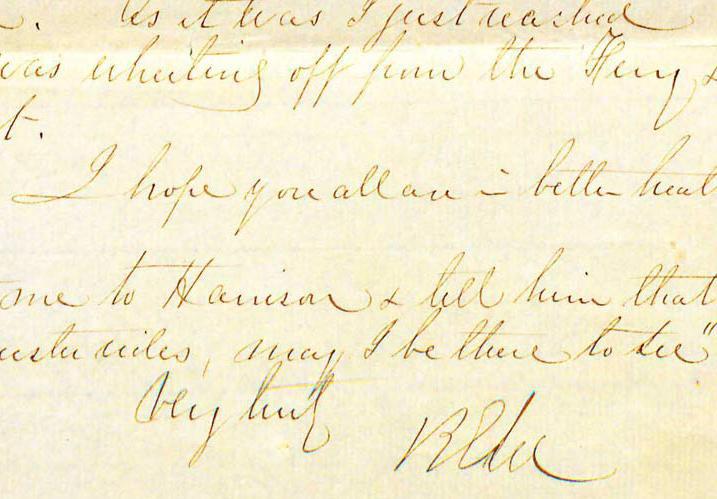
Tucked away at the bottom of a pile of nondescript letters in an archival box in the basement of Greenwood Library was a hidden treasure: an envelope bearing the name of one of the most recognizable figures in U.S. history.
Gen. Robert E. Lee.
The two notes within, written in an elegant hand on lined paper and signed "R.E. Lee," date from before and after the Civil War—which ended up taking Lee and his Army of Northern Virginia through Farmville in its closing days.
The first, dated April 26, 1845, is addressed to Capt. Henry Brewerton, who was also working as a captain in the Army Corps of Engineers. A dark orange wax seal appears near both margins on the outside of the letter. At the time, Lee was the post engineer at Fort Hamilton in Brooklyn, N.Y., and a member of West Point’s board of visitors.
The second letter, dated Nov. 10, 1868, endorses a letter of recommendation for Washington College student William M. Thornton. Written just two years before Lee’s death, the endorsement appears on the opposite side of a letter written by John L. Campbell, a chemistry professor at the school.
The letters had been sitting in an archival box meticulously filed away in Longwood’s library for at least three decades before they were rediscovered in July after the university’s archives and records specialist, Lydia Williams, began the process of detailing some of the collections.
"This is a hidden treasure," said Gavin Hosman, an archives and library information associate who found the letters. "When I saw the writing on the envelope, I thought it couldn’t have been true. The envelope was kind of buried in the bottom of the box, which is an ordinary stationery box. It looked like just an ordinary pile of things from someone’s house."
Most library archives are categorized by boxes with only a general description of what content is inside. With Hosman on board, Williams made it a priority this year to perform a more detailed cataloging of some of the higher-level archives, including the Johnston Family Collection, where the Lee letters were found.
The collection is mostly letters pertaining to the once-prominent Farmville family from whose estate Longwood’s name is derived. A member of the family, Confederate Gen. Joseph E. Johnston, was commander of the Army of Northern Virginia before being replaced by Lee in 1862.
Williams, who has worked in Greenwood Library since 1972 and overseen the archives since 1991, transcribed both letters, which, though they are fairly regular correspondences from a man of Lee’s position, offer some insight into his day-to-day affairs and priorities.
"The letters provide a glimpse into Lee’s activities both before and after the Civil War," said Dr. David Coles, a Longwood history professor who is a Civil War specialist. "They give some indication of his prominence in the prewar U.S. Army and in the efforts of the South to rebuild following its devastating defeat in the Civil War."
The 1845 letter to Henry Brewerton reads: "Confefs [confess] my dear Squire that I have returned your estimate for the Cadet Barrack at W.P. [West Point] & that it is better late than never. I had scarcely time to shake hands with you at the American. As it was I just reached Brooklyn as the state was heading off from the Ferry and succeeded in hailing it. I hope that you are in better health than we are. Present me to Harrison and tell him that ‘When he assents to [McCester] rides may I be there to see.’ My best, R. E. Lee."
Two years after Lee sent that correspondence, Brewerton became superintendent of West Point, a post he held until being replaced by Lee in 1852.
The 1868 letter reads: "Although not personally acquainted with Mr. Wm M. Thornton, I have known his mother for several years and know that he is related to several of the most influential families in Virginia; and from my knowledge of performance of John L. Campbell I can say that in him all confidence can be found in his statement. R.E. Lee."
The William Thornton in the letter is likely the University of Virginia mathematics professor who joined the faculty there in 1868. Thornton enjoyed a long and distinguished career at U.Va., becoming the chairman of the faculty and first dean of engineering.
Tom Camden, head of special collections and university archives at Washington and Lee, which has an extensive repository of Lee letters, examined both letters and found the juxtaposition of styles notable.
"It’s somewhat rare to find a letter from Lee and even more uncommon to find a letter in which he is endorsing a faculty member’s recommendation. It’s a clear indication of how thorough Lee was in taking care of business," said Camden. "The early Lee letter shows a slightly less sure hand and is less bold in its execution, and the content is obviously a little less formal. Pre-Civil War letters from Lee are much more rare than correspondence after the war broke out."
The letters are now housed in Greenwood Library’s special collections room while library staff works to have them professionally authenticated, though the experts who have seen the correspondence have little doubt they are genuine Lee letters.

